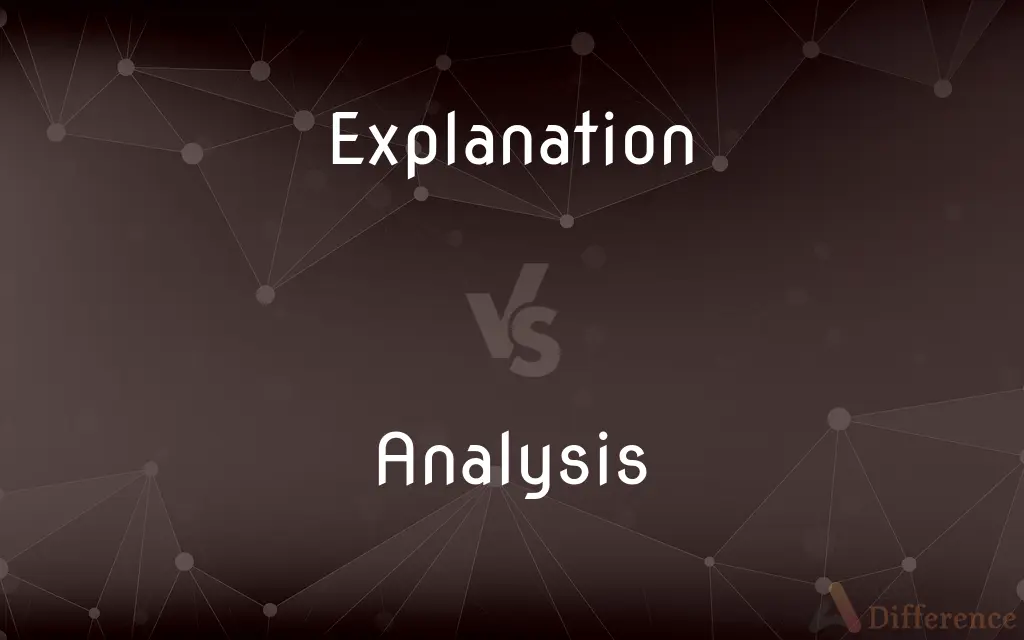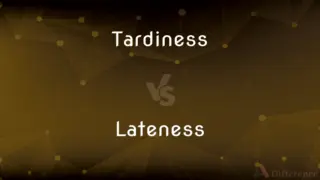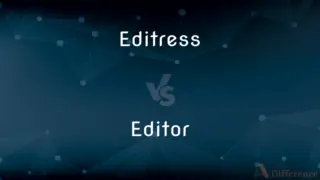Explanation vs. Analysis — What's the Difference?
By Tayyaba Rehman & Fiza Rafique — Updated on March 8, 2024
Explanation details the 'how' and 'why' of a topic, while analysis breaks it down to understand its components and relationships.

Difference Between Explanation and Analysis
Table of Contents
ADVERTISEMENT
Key Differences
An explanation provides clarity on a subject by elaborating on its mechanisms, reasons, or underpinning principles. It aims to make something understandable by describing its processes or causes. For instance, explaining how photosynthesis works involves outlining the steps plants use to convert sunlight into energy. In contrast, analysis involves dissecting a topic to examine its individual elements and how they interact or relate to each other. Analyzing photosynthesis might involve looking at the efficiency of different pigments in absorbing light or the impact of varying light intensities on the process.
Explanation often takes a more descriptive approach, focusing on narrating the events, processes, or concepts to offer insight into their nature or function. It seeks to provide a comprehensive understanding of a topic in a way that is accessible and coherent. Analysis, on the other hand, is more critical and evaluative, aiming to delve deeper into a subject by questioning, comparing, and contrasting its components to draw conclusions or uncover underlying patterns or themes.
In educational contexts, explanations are crucial for introducing new concepts and providing the foundational understanding necessary for further exploration. Teachers explain theories, historical events, or scientific principles to build students' knowledge base. Analysis comes into play when students are encouraged to think critically about the information presented, examining its parts, questioning assumptions, and exploring connections to other concepts or real-world implications.
In literature or art, an explanation might detail the plot of a story or describe the technique used in a painting, helping the audience grasp the content or method. Analysis in these fields would involve interpreting themes, symbols, or the use of language in literature and the influence of historical and cultural contexts on a work of art, offering deeper insights into its significance and impact.
Both explanation and analysis are fundamental to academic and intellectual pursuits, each serving distinct yet complementary roles. Explanation lays the groundwork by clarifying and elucidating, while analysis builds on this foundation, fostering a deeper and more nuanced understanding through critical examination and interpretation.
ADVERTISEMENT
Comparison Chart
Definition
Clarifies the 'how' and 'why' of a topic, making it understandable.
Dissects a topic to understand its components and their interrelations.
Approach
Descriptive, focusing on elucidation and clarity.
Critical and evaluative, focusing on dissecting and questioning.
Purpose
To make a concept, process, or event clear and comprehensible.
To examine the elements of a subject and how they connect or affect each other.
Usage in Education
Introducing and clarifying new concepts or information.
Encouraging critical thinking and deeper exploration of concepts.
Role in Literature/Art
Describing content, technique, or context for better comprehension.
Interpreting themes, symbols, and contextual influences for deeper insight.
Compare with Definitions
Explanation
A detailed account of how and why something happens.
The teacher's explanation of the water cycle made its processes clear to the students.
Analysis
Breaks down a topic to examine its individual parts.
Her analysis of the novel revealed underlying themes of identity and freedom.
Explanation
Describes the reasoning or rationale behind actions or decisions.
The director's explanation shed light on the movie's ambiguous ending.
Analysis
Evaluates or interprets data, texts, or events to draw conclusions.
The scientist's analysis of the data confirmed the hypothesis.
Explanation
Elucidates the principles or laws governing a subject.
The lecture included a detailed explanation of Newton's laws of motion.
Analysis
Identifies patterns, trends, or underlying principles in a subject.
The market analysis showed a trend towards eco-friendly products.
Explanation
Provides answers to questions or solutions to problems.
The mechanic's explanation revealed the cause of the car's malfunction.
Analysis
Involves critical thinking to understand complex relationships.
His analysis of historical events highlighted the causes of the conflict.
Explanation
Clarifies concepts or phenomena for better understanding.
His explanation of quantum mechanics simplified its complex theories.
Analysis
Assesses the effectiveness or implications of a concept or process.
The policy analysis predicted significant impacts on economic growth.
Explanation
An explanation is a set of statements usually constructed to describe a set of facts which clarifies the causes, context, and consequences of those facts. This description may establish rules or laws, and may clarify the existing rules or laws in relation to any objects, or phenomena examined.Explanation, in philosophy, is a set of statements that makes intelligible the existence or occurrence of an object, event, or state of affairs.
Analysis
Analysis is the process of breaking a complex topic or substance into smaller parts in order to gain a better understanding of it. The technique has been applied in the study of mathematics and logic since before Aristotle (384–322 B.C.), though analysis as a formal concept is a relatively recent development.The word comes from the Ancient Greek ἀνάλυσις (analysis, "a breaking-up" or "an untying;" from ana- "up, throughout" and lysis "a loosening").
Explanation
The act or process of explaining
Launched into a detailed explanation.
Analysis
Detailed examination of the elements or structure of something
Statistical analysis
An analysis of popular culture
Explanation
Something that explains
That was supposedly the explanation for their misdeeds.
Analysis
Short for psychoanalysis
Other schools of analysis have evolved out of the original disciplines established by Freud
Explanation
A mutual clarification of misunderstandings; a reconciliation.
Analysis
The separation of an intellectual or material whole into its constituent parts for individual study.
Explanation
The act or process of explaining.
The explanation was long and drawn-out.
Analysis
The study of such constituent parts and their interrelationships in making up a whole.
Explanation
Something that explains, makes understandable.
An explanation for the UFO sightings was easily found.
Analysis
A spoken or written presentation of such study
Published an analysis of poetic meter.
Explanation
A resolution of disputed points pursuant to discussion; a mutual clarification of disputed points; reconciliation.
Analysis
The separation of a substance into its constituent elements to determine either their nature (qualitative analysis) or their proportions (quantitative analysis).
Explanation
The act of explaining, expounding, or interpreting; the act of clearing from obscurity and making intelligible; as, the explanation of a passage in Scripture, or of a contract or treaty.
Analysis
The stated findings of such a separation or determination.
Explanation
That which explains or makes clear; as, a satisfactory explanation.
Analysis
A branch of mathematics principally involving differential and integral calculus, sequences, and series and concerned with limits and convergence.
Explanation
The meaning attributed to anything by one who explains it; definition; interpretation; sense.
Different explanations [of the Trinity].
Analysis
The method of proof in which a known truth is sought as a consequence of a series of deductions from that which is the thing to be proved.
Explanation
A mutual exposition of terms, meaning, or motives, with a view to adjust a misunderstanding, and reconcile differences; reconciliation; agreement; as, to come to an explanation.
Analysis
(Linguistics) The use of function words such as prepositions, pronouns, or auxiliary verbs instead of inflectional endings to express a grammatical relationship; for example, the cover of the dictionary instead of the dictionary's cover.
Explanation
A statement that makes something comprehensible by describing the relevant structure or operation or circumstances etc.;
The explanation was very simple
I expected a brief account
Analysis
Psychoanalysis.
Explanation
Thought that makes something comprehensible
Analysis
Systems analysis.
Explanation
The act of explaining; making something plain or intelligible;
I heard his explanation of the accident
Analysis
(countable) Decomposition into components in order to study (a complex thing, concept, theory etc.).
Analysis
(countable) The result of such a process.
Analysis
The mathematical study of functions, sequences, series, limits, derivatives and integrals.
Mathematical analysis
Analysis
Proof by deduction from known truths.
Analysis
The process of breaking down a substance into its constituent parts, or the result of this process.
Analysis
The analytical study of melodies, harmonies, sequences, repetitions, variations, quotations, juxtapositions, and surprises.
Analysis
Psychoanalysis.
Analysis
A resolution of anything, whether an object of the senses or of the intellect, into its constituent or original elements; an examination of the component parts of a subject, each separately, as the words which compose a sentence, the tones of a tune, or the simple propositions which enter into an argument. It is opposed to synthesis.
Analysis
The separation of a compound substance, by chemical processes, into its constituents, with a view to ascertain either (a) what elements it contains, or (b) how much of each element is present. The former is called qualitative, and the latter quantitative analysis.
Analysis
The tracing of things to their source, and the resolving of knowledge into its original principles.
Analysis
The resolving of problems by reducing the conditions that are in them to equations.
Analysis
A syllabus, or table of the principal heads of a discourse, disposed in their natural order.
Analysis
The process of ascertaining the name of a species, or its place in a system of classification, by means of an analytical table or key.
Analysis
An investigation of the component parts of a whole and their relations in making up the whole
Analysis
The abstract separation of a whole into its constituent parts in order to study the parts and their relations
Analysis
A form of literary criticism in which the structure of a piece of writing is analyzed
Analysis
The use of closed-class words instead of inflections: e.g., `the father of the bride' instead of `the bride's father'
Analysis
A branch of mathematics involving calculus and the theory of limits; sequences and series and integration and differentiation
Analysis
A set of techniques for exploring underlying motives and a method of treating various mental disorders; based on the theories of Sigmund Freud;
His physician recommended psychoanalysis
Common Curiosities
How does one transition from explanation to analysis in writing?
After explaining a concept or event, one can transition to analysis by critically examining its components, questioning assumptions, and exploring implications.
Can you have an analysis without an explanation?
Analysis often builds upon explanations, but it's possible to analyze a topic using established knowledge without providing a new explanation.
Is explanation more important than analysis?
Both are crucial; explanation provides foundational understanding, while analysis offers deeper insight and understanding.
How does an explanation differ from an analysis?
An explanation aims to make a topic understandable by detailing its how and why, while analysis dissects the topic to explore its components and their interrelations.
How do explanation and analysis contribute to scientific understanding?
In science, explanations help articulate theories and phenomena, while analysis is used to test hypotheses and explore the validity of scientific models.
Can analysis lead to new explanations?
Yes, thorough analysis can uncover new insights, leading to novel explanations or theories.
How are explanation and analysis used in problem-solving?
Explanation helps understand the problem and its context, while analysis is applied to dissect the problem, explore solutions, and evaluate their effectiveness.
How do explanation and analysis work together in academic research?
In academic research, explanations provide clarity on concepts and processes, while analysis is used to examine hypotheses, data, and theories critically.
Why is explanation important in teaching?
Explanation is vital in teaching as it helps students grasp new concepts, making the learning process more accessible and effective.
What role does analysis play in critical thinking?
Analysis is central to critical thinking as it involves evaluating information, identifying biases, and making informed judgments.
Share Your Discovery

Previous Comparison
Tardiness vs. Lateness
Next Comparison
Editress vs. EditorAuthor Spotlight
Written by
Tayyaba RehmanTayyaba Rehman is a distinguished writer, currently serving as a primary contributor to askdifference.com. As a researcher in semantics and etymology, Tayyaba's passion for the complexity of languages and their distinctions has found a perfect home on the platform. Tayyaba delves into the intricacies of language, distinguishing between commonly confused words and phrases, thereby providing clarity for readers worldwide.
Co-written by
Fiza RafiqueFiza Rafique is a skilled content writer at AskDifference.com, where she meticulously refines and enhances written pieces. Drawing from her vast editorial expertise, Fiza ensures clarity, accuracy, and precision in every article. Passionate about language, she continually seeks to elevate the quality of content for readers worldwide.















































